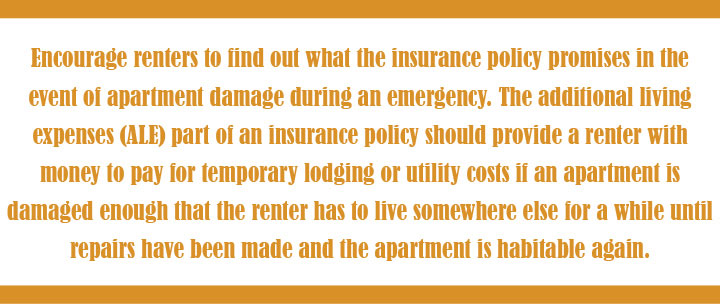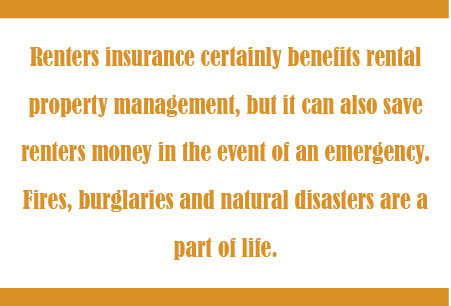By Susan Morgan, The newsLINK Group
One of the most important business decisions you will make in the property management business is the rent you charge. It consists of two parts: determining whether people can afford the rent and also whether they think it is a fair trade for what you are giving them.
Some property management companies are reluctant to mandate renters insurance for just that reason. They don’t want to increase the total cost of leasing. Setting the total cost too high, after all, can lower demand if people then decide to buy a place to live instead of renting it. If too many people choose to buy instead of rent, pricing strength weakens right along with occupancy and revenue.
Do the facts support this argument? Consider the following:
- During the last 10 years, renting an apartment has definitely become a lifestyle choice, one that has been made by the 19 million people in the U.S. who currently live in one. Experts expect the market to grow by an additional 4 million new rental households during the next 10 years.
- ORC International conducted an Insurance Information Institution poll. According to the poll, 95% of homeowners have homeowners insurance, but only 40% of renters have renters insurance.
An increased number of renters results in increased revenue for the property management business, but it also means increased risk. Why is it that homeowners are opting for insurance to mitigate that risk and renters are not? Common fallacies include:
- A belief that property insurance policies cover household contents. Property insurance actually covers only the buildings and infrastructure, not a person’s possessions.
- Thinking that personal belongings are not worth much and are therefore not worth insuring. USAA estimates that the average renter owns possessions worth $20,000. Allstate puts the average higher, at $30,000.
- The belief that rental insurance is too expensive. It is certainly true that health insurance and car insurance are both expensive, but renters insurance is surprisingly affordable. According to a state-by-state comparison performed by
Insure.com, the median annual cost of car insurance is slightly more than $1,300. That puts monthly premiums at slightly more than $108 per month. Renters insurance, on the other hand, is approximately $12 a month or $144 a year, assuming someone buys a policy for $30,000 of property coverage and $100,000 of liability coverage.
RealPage, Inc., a company that was founded in 1998 and that provides property management software solutions for markets within the rental housing industries, decided to research this issue. Richard Hughes, who is the head of Data Science and Senior vice president of Strategic Revenue Systems, wrote a white paper for RealPage, Inc. in which he summarized the results of a study about the impact of renters insurance on revenue generation.
The study involved benchmarking multiple management companies that implemented mandatory renters insurance in 2008. Those conducting the study benchmarked the companies’ cumulative indexed revenue performance against their markets, submarkets and ZIP codes. What they found was that mandatory renters insurance did not impede performance. Communities that mandated rental insurance beat the market index and the ZIP code index but not the submarket index. However, the difference between the communities and the indexes was not significant regardless of the result.
If renters insurance is cheap enough that it doesn’t impact whether someone will continue to rent from you, what does that mean in terms of implementing a mandated insurance program?
Most renters are probably interested in bundling their coverage and their other insurance coverage to get a better rate. Doing so presents two problems:
- How does the renter know bundled coverage is adequate? When insurance products are bundled, the chance of someone needing to file a claim is bigger with multiple policies than it would be with a single policy, which means policies are subject to cancellations and premium hikes.
- How do you know whether someone is maintaining renters insurance? Insurance companies are perfectly capable of dropping someone’s coverage and have no requirement to notify the property management company of that change in status.

If you are going to mandate renters insurance, it is probably better to have renters do so with a separate policy. Be sure to select a company that will tell you when a policy lapses, is about to expire or has been cancelled. It is also possible for providers to send renters automated email reminders when they move in and when they are not covered anymore.
What should renters insurance cover?
- Theft coverage is different from burglary coverage. If someone is robbed, it’s necessary to prove forced entry or some other kind of break-in before burglary coverage will kick on. For theft coverage, a renter just has to file a police report about the theft and then provide the insurance company with a copy of the report. As a result, renters will do better with theft coverage than burglary coverage.
- Coverage should be for more than just an apartment. It should also cover anything in a car, garage or storage unit, as well as for losses that occur while traveling.
- Since a renter might have multiple roommates and the occasional guest, rental insurance should cover these people as well.
- Immediate qualification and same-day coverage are also important. If a renter has to wait for a background or credit check, that is a period of vulnerability. Same-day coverage is important because renters should know that they are covered the very day they move in. That’s a day that involves carrying a lot of boxes and furniture, which means it is also a bad day not to be protected in the event of an accident.
- Payment options and deductible levels matter. Common deductibles are $250, $500 and $1,000. Insurance plans should also allow convenient payment structures for renters to make payments once a year, once every six months, once every three months or monthly.
- Encourage renters to find out what the insurance policy promises in the event of apartment damage during an emergency. The additional living expenses (ALE) part of an insurance policy should provide a renter with money to pay for temporary lodging or utility costs if an apartment is damaged enough that the renter has to live somewhere else for a while until repairs have been made and the apartment is habitable again.
- Does the renter have a pet? Pet damage endorsements are a good idea, but it’s better for the renter not to have a breed restriction on the policy. These endorsements cover damage that wouldn’t be covered adequately by a pet deposit. If a dog destroys the baseboard or ruins carpeting by urinating on it, pet damage endorsements can pay for the repair work and new carpet.
- Policies often have other optional endorsements. For example, maybe coverage for $50,000 is more appropriate than coverage for $20,000. A renter might also be interested in having liability coverage for issues such as toilets, showers, and bathtubs that overflow and cause water damage.

Renters insurance certainly benefits rental property management, but it can also save renters money in the event of an emergency. Fires, burglaries and natural disasters are a part of life. By mandating renters insurance, you protect everyone involved at very little cost to the person renting from you.
If renters understand the benefits, they are likely to appreciate the fact that you are making sure they are covered when it comes to anything expensive and unpredictable. Insured losses caused by natural disasters cost $25.5 billion in 2019. With that kind of money at stake, it makes all kinds of sense for renters insurance to be mandatory.
Susan Morgan, The newsLINK Group
This story appears in Issue 5 2020 of the Apartment Focus Magazine.







